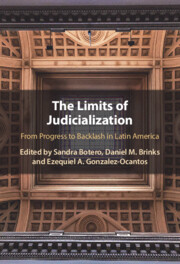Book contents
- The Limits of Judicialization
- The Limits of Judicialization
- Copyright page
- Contents
- Figures
- Tables
- Contributors
- Acknowledgments
- 1 Working in New Political Spaces
- 2 Critical Disconnects
- 3 When Winning in the Courts Is Not Enough
- 4 Forms of Countermovement and Counter-Reform in Latin America
- 5 Backlash against State Strengthening Reforms
- 6 Backlash against Corporate Accountability for Grave Human Rights Violations in Colombia
- 7 Courting Judicial Legitimacy
- 8 Family Ties and Nepotism in the Mexican Federal Judiciary
- 9 Judicial Corruption
- 10 Kickbacks, Crackdown, and Backlash
- 11 Turning Corruption Trials into Political Tools in the Name of Transparency
- 12 Fighting Corruption, Dismantling Democracy
- 13 Prosecutorial Agency, Backlash and Resistance in the Peruvian Chapter of Lava Jato
- Index
- References
11 - Turning Corruption Trials into Political Tools in the Name of Transparency
The Lava Jato Case
Published online by Cambridge University Press: 11 August 2022
- The Limits of Judicialization
- The Limits of Judicialization
- Copyright page
- Contents
- Figures
- Tables
- Contributors
- Acknowledgments
- 1 Working in New Political Spaces
- 2 Critical Disconnects
- 3 When Winning in the Courts Is Not Enough
- 4 Forms of Countermovement and Counter-Reform in Latin America
- 5 Backlash against State Strengthening Reforms
- 6 Backlash against Corporate Accountability for Grave Human Rights Violations in Colombia
- 7 Courting Judicial Legitimacy
- 8 Family Ties and Nepotism in the Mexican Federal Judiciary
- 9 Judicial Corruption
- 10 Kickbacks, Crackdown, and Backlash
- 11 Turning Corruption Trials into Political Tools in the Name of Transparency
- 12 Fighting Corruption, Dismantling Democracy
- 13 Prosecutorial Agency, Backlash and Resistance in the Peruvian Chapter of Lava Jato
- Index
- References
Summary
Lava Jato (Car Wash) was one of the largest corruption trials in the world. The Lava Jato taskforce launched a battle against powerful political actors using legal tools creatively and sought to garner public support by resorting to the media. The chapter examines three examples that illustrate these two strategies and unpacks their legal dimensions. It focuses on three decisions by Sergio Moro, Lava Jato’s most prominent judge: ordering the police to bring former president and 2018 presidential candidate Lula Da Silva in for questioning without a previous request, disclosing a recorded conversation obtained during an investigation against Lula, and making public a plea bargain agreement that incriminated Lula. The chapter outlines the political impact of Moro’s actions and examines them in light of current Brazilian legislation on transparency and accountability for judges’ behaviour. It finds that while transparency is a principle that informs criminal trials in Brazil, Moro pushed the existing rules to their limits to gain public support. At the same time, he attempted to influence public opinion by taking advantage of the discretion the Brazilian inquisitorial criminal system provides judges. The chapter also analyses the limitations of Brazilian legislation to prevent this kind of behaviour and points to the challenges of reforming it. It concludes that while courts’ mobilization of the media and creative use of legal tools may increase anti-corruption accountability, the costs of this strategy outweigh its benefits.
Keywords
- Type
- Chapter
- Information
- The Limits of JudicializationFrom Progress to Backlash in Latin America, pp. 266 - 288Publisher: Cambridge University PressPrint publication year: 2022
References
- 5
- Cited by

